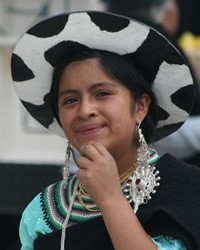A description by Father Pedro Arias Dávila (1582):
"In the same way they brought war to a province called Saraguros, which is 7 leagues and 8 from this land; the reason, because they were friends of the Spanish, and these Saraguros not, but that beforehand many Spanish killed them in ambushes and on roads, and gave war to these and to Canaribamba; because these did not serve the Spanish. This is the reason for there being today so few Indians.
The Saraguro live in the Andean highlands of southern Ecuador, primarily in Loja province, Ecuador, with smaller numbers in the province of Zamora Chinchipe.
Their primary language is Spanish, but Quichua is still spoken by older people.
"Traditionally, the Saraguro were self-sufficient agro-pastoralists. Most Saraguros were able to provide much of their food needs such as maize, potatoes, beans, squash, oca and melloco. Their clothing was primarily made from wool sheared from their own herds of sheep. In addition to cattle and sheep, Saraguros raised guinea pigs, chickens and guard dogs; many also raised a few pigs and horses or mules. A few Saraguros supplemented their agro-pastoral incomes by selling or bartering textiles, baskets, mats and pottery by offering their services as curers, and by employment as unskilled or semi-skilled laborers. Few Saraguros had an education and access to medicine was limited." 1
"Today, Saraguros are carpenters and shoe makers, nuns, doctors, dentists, nurses, veterinarians, lawyers, musicians, elected officials in government, shop owners, gold-camp laborers, construction laborers, maids, mechanics, welders and teachers. Some Saraguros have continued their agro-pastoral activities, but access to a wider range of occupations, political power, medical care and education and to travel have changed the Saraguro way of life." 1, 2
They are generally a courteous and respectful people, conservative and timid towards outsiders, independent and self-sufficient, responsible and autonomous from an early age. Life is centred around the nuclear (immediate) family with gender-equality. Their identity is connected with their clothes and beliefs, not their language.
They are generally devout Catholics with an impersonal and vague knowledge of God. However, their beliefs are syncretistic. They are devoted to the Virgen of Cisne, a so-called post-biblical apparition of Mary in Loja province. The sun-god, Inti is very prominent in their lives. They practice the veneration and placation of an array of saints, nature spirits (such as that of the earth, the moon, maize) and demons.
Pray for full time workers both Ecuadorian and international.
Pray for the struggling evangelical churches to be revived and strengthened. They are what the general Saraguro population sees as the representation of Christianity.
Pray that the Holy Spirit would open the hearts of the people to the gospel.
Scripture Prayers for the Quichua, Loja Highland in Ecuador.
http://goo.gl/sWTCg
http://www.saraguro.org/overview.htm
| Profile Source: Anonymous |










